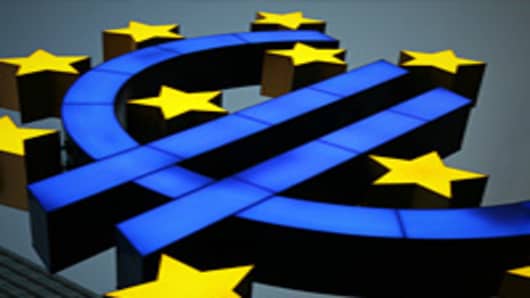The European Central Bank raised interest rates by 25 basis points to 1.50 percent on Thursday, as it continued to brush off concerns over slow growth and sovereign debt worries in the euro zone periphery. ECB President Jean-Claude Trichet hinted at his press conference that a further rise in August is unlikely.
The ECB also raised its marginal lending rate by 25 basis points to 2.25 percent and its deposit rate to 0.75 percent.
Speaking at a press conference following the decision, Trichet said that the bank will "monitor very closely" upside risks to price stability in the euro zone. In the ECB's code word system, this generally indicates that the bank will not raise rates at the next meeting, analysts have said.
Trichet said that the bank was concerned about inflation, which currently stands at 2.7 percent, above the target rate of 2 percent. Inflation risks are to the upside, he said, particularly due to increasing energy prices.
"The underlying pace of monetary expansion is continuing to gradually recover, while monetary liquidity remains ample with the potential to accommodate price pressures in the euro area. All in all, it is essential that the recent price developments do not give rise to broad-based inflationary pressures over the medium term," Trichet said.
"Our decision will contribute to keeping inflation expectations in the euro area firmly anchored in line with our aim of maintaining inflation rates below, but close to, 2 percent over the medium term. Such anchoring is a prerequisite for monetary policy to contribute to economic growth in the euro area."
Trichet told a press conference following the June rate decision that the bank would be "strongly vigilant", code words for a rate hike at the next meeting, so markets had been expecting Thursday's announcement.
The ECB had been holding rates at record lows of 1 percent during the economic crisis, but with growth returning to the euro zone – led by Germany – the bank has gradually been tightening its monetary policy, raising rates by 25 basis points in April.
Saxobank group CIO Steen Jakobsen told CNBC.com that the rate hike was more of a political consideration than an economic one.
"I think the ECB is in a corner, and the only tool left for them to use to create some sort of noise is hiking rates," Jakobsen said.
"I think the gap between what the politicians do and the market is growing, not only in terms of defining a (Greek) default and what needs to be done in terms of the structure," Jakobsen said.
"Trichet, increasingly, at the tail end of his presidency, I think will avoid at all costs losing face, in terms of an actual default, which means that the ECB has to sit and wait, and the only thing they can signal is that they have credibility in terms of fighting inflation."
Trichet's press conference following the rate decision will give markets more indication of where rates are going. Jakobsen expected more talk of fighting inflation, but little else. Trichet has a habit of making hawkish statements one month, before stepping back the next.
"The schism is that he can only talk strong rhetoric about inflation and his credibility on inflation, but at the same time his economic fundamentals are eroding month-by-month, even in Germany," he said. "The spread between his rhetoric and his practical ability to manoeuvre is limited."
"Hiking (rates) now, and indicating another one right away would be giving away his cards. From a game theory point of view, if nothing else, playing into an October hike would be too early," Jakobsen said.
He added that the markets may not be convinced by today's decision.
"If the market calls (Trichet's) bluff, saying, well, you're hiking rates for political reasons only, then the reaction should be that people will start buying bunds and spreads in the periphery will go up," he said.
Jakobsen also noted that the ECB has been "backed into a corner" by its balance sheet, which has seen the bank take a large exposure to peripheral countries' debt.
Research from HSBC showed that the euro system – the ECB and euro zone central banks – could stand to lose 23 billion euros on their bond holdings in peripheral countries, in the event of a 50 percent haircut on Greek, Portuguese and Irish debt.
The ECB has said that it will waive the threshold requirements on the use of Irish sovereign debt as collateral, and has said that it will only consider Greek, Irish or Portuguese debt to be in default where all of the rating agencies concur that there has been a default.
In response to questions over the potential for a selective default in Greece, Trichet repeated, "We say no to selective default."
There is a potential legal concern, should the rating agencies downgrade Greek debt, and should the ECB continue to use that debt as collateral, according to HSBC economist Astrid Schiller.
"If the Eurosystem accepts collateral that rating agencies, or any other institution deem to be in default, there is the possibility that some (be it a eurozone citizen, a financial market participant or an academic) will consider the Eurosystem to be in breach of Article 123 of the European Treaty, which prohibits the financing of government deficit," she wrote in a research note.
A default may also presage the need for even more intervention in financial markets, which would put legal, financial and reputational pressure on the euro system, she added.
"Overall, it seems to us this is a typical case of ‘You can’t have your cake and eat it’. When the financial crisis threatens to destabilise the (global) economy, observers are quick to call for resolute euro system action," Schiller said. "However, once this has happened, people question the quality of the euro system’s balance sheet."


